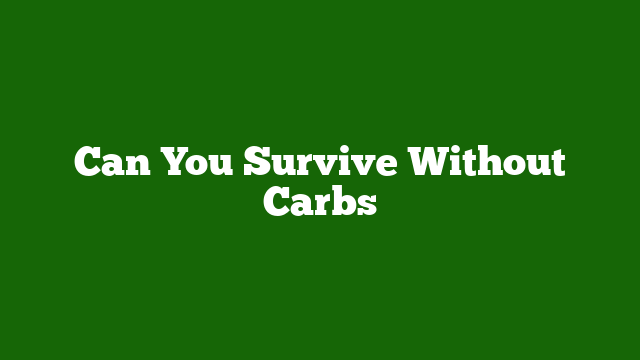Last Updated on June 12, 2023 by Umar
Carbohydrates are a major component of our daily diet, making up a large percentage of the U.S.
food supply and contributing anywhere from 50–60% of calories since 1910
. But can you survive without carbs?
This comprehensive guide will explore personal experiences, research, and statistics to answer this question.
Personal Experiences
One individual shared their experience of going 100% refined carb-free for a month, cutting out all forms of breads, pastas, chips, and fries
. They experienced withdrawal symptoms such as relentless, pounding headaches, similar to those experienced when cutting off caffeine, alcohol, or drugs.
However, after the initial withdrawal phase, they reported feeling more energetic and losing weight.
Research and Statistics
The 2015 Dietary Guidelines for Americans set the acceptable macronutrient distribution for carbohydrates at 45–65% of total daily calories
. The World Health Organization and Food and Agriculture Organization recommend that 55% of total calories come from carbohydrates per day.While technically you can survive on just protein and fats, it’s not necessarily healthy.
The human body is capable of reforming amino acids from protein into glucose, which can provide energy in the absence of carbohydrates. However, low-carb diets may not be sustainable and can lead to tiredness and mood swings.
Low-carb diets, such as the Atkins diet, have been popular for weight loss and diabetes management. These diets typically involve consuming 20 to 100 grams of carbs per day and can be effective for short-term weight loss. However, long-term efficacy and safety of low-carb diets are still debated.
A diet high in simple carbs, like pastries, white bread, and cookies, is associated with an increased risk of chronic diseases like diabetes and obesity.
Therefore, it’s essential to focus on consuming complex carbohydrates from whole grains, fruits, and vegetables for optimal health.
Conclusion
While it is possible to survive without carbs, it may not be the healthiest or most sustainable option.
Carbohydrates are an essential part of a well-balanced diet, providing energy and essential nutrients.
It’s important to focus on consuming complex carbohydrates from whole grains, fruits, and vegetables, rather than simple carbs found in processed foods, for optimal health and well-being.
Helpful Resources
- https://blog.myfitnesspal.com/ask-dietitian-can-you-survive-without-carbs/
- https://www.rd.com/list/no-carb-diet/
- https://www.fooducate.com/community/post/Can-Humans-Survive-on-Zero-Carbs%3F/60C5C8EA-3353-B46B-4691-86C61C9A0A9B
- https://www.chubb.com/hk-en/chubblifebalance/without-carbs.html
- https://www.forbes.com/health/body/low-carb-diet/

